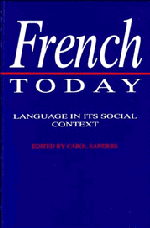Book contents
- Frontmatter
- Contents
- List of figures and maps
- List of tables
- Notes on the contributors
- Acknowledgements
- Introduction
- 1 French: a planned language?
- 2 Sociosituational variation
- 3 Regional variation in France
- 4 The other languages of France: towards a multilingual policy
- 5 The migrant languages of Paris
- 6 Gender and language in French
- 7 The reform of the writing system
- 8 Alternative French
- 9 New words for new technologies
- 10 Language and style in politics
- 11 French and French-based Creoles: the case of the French Caribbean
- 12 French in Africa
- 13 French in Canada
- 14 Sociolinguistic variation and the linguist
- Bibliography
- Index
13 - French in Canada
Published online by Cambridge University Press: 05 June 2012
- Frontmatter
- Contents
- List of figures and maps
- List of tables
- Notes on the contributors
- Acknowledgements
- Introduction
- 1 French: a planned language?
- 2 Sociosituational variation
- 3 Regional variation in France
- 4 The other languages of France: towards a multilingual policy
- 5 The migrant languages of Paris
- 6 Gender and language in French
- 7 The reform of the writing system
- 8 Alternative French
- 9 New words for new technologies
- 10 Language and style in politics
- 11 French and French-based Creoles: the case of the French Caribbean
- 12 French in Africa
- 13 French in Canada
- 14 Sociolinguistic variation and the linguist
- Bibliography
- Index
Summary
Introduction
By the Official Languages Act (1969) Canada recognised English and French as having equal status in Parliament and the Canadian government, in the federal administration, judicial bodies and crown corporations. This ‘institutional bilingualism’, which is not to be confused with Individuals' ability to operate in these two languages, has since been extended to one province, New Brunswick, which is officially bilingual in English and French, and to some institutions, notably in the areas of law and education, in other provinces. Quebec, however, while being institutionally bilingual in federal matters, recognises only French as the official language of the province (Bill 101 or Charter of the French Language; see Tetley 1986). Before examining the implications of institutional English–French bilingualism and of the presence of speakers of other languages (allophones) for the French language in Canada, it is first necessary to look briefly at the history, the geographical distribution, and the main linguistic characteristics of Canadian French. In what follows I will adopt an interdisciplinary approach, looking at Canadian French from the standpoints of linguistics, sociolinguistics, and the sociology and social psychology of language.
A brief history of French settlements in Canada
In the early seventeenth century France founded two colonies in North America: Acadia, on the Atlantic seaboard, roughly corresponding to today's Nova Scotia, New Brunswick and Prince Edward Island; and New France, at one time covering most of the North American continent, the strip of land extending along the banks of the St Lawrence being loosely known as Canada, and its French population calling themselves canadiens or habitants.
- Type
- Chapter
- Information
- French TodayLanguage in its Social Context, pp. 240 - 256Publisher: Cambridge University PressPrint publication year: 1993
- 2
- Cited by



